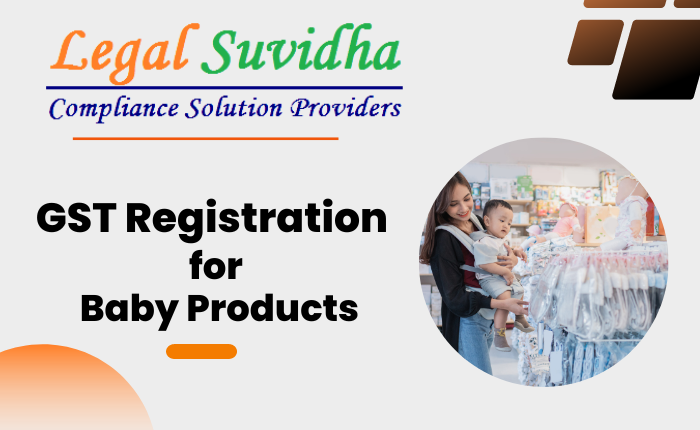In the context of the thriving baby product industry, the imperative of GST registration cannot be overlooked, as it not only ensures regulatory compliance but also paves the way for exponential business expansion.
Within the vast landscape of the baby product sector in India, characterized by an extensive array of offerings to cater to the needs of parents and their offspring, several influential factors drive its growth trajectory.
Firstly, the escalating disposable income of families plays a pivotal role, enabling them to allocate more financial resources towards purchasing baby products.
As the number of families with higher disposable income increases, the demand for such products rises proportionally.
Secondly, evolving lifestyles contribute significantly to the sector’s advancement. An increasing trend of families having children at a later stage in life results in augmented disposable income, which, in turn, bolsters spending on baby products.
Additionally, the preference for urban living, where convenience products and services are in high demand, fuels the industry’s growth further.
Furthermore, the growing awareness among parents concerning child health and well-being has a profound impact.
- Parents now recognize the significance of providing their children with products that are safe, organic, natural, and devoid of harmful chemicals.
- This heightened awareness translates into a surge in demand for health-conscious baby products.
In the context of India’s tax regime, GST (Goods and Services Tax) plays a pivotal role as a unified tax levied on the supply of goods and services throughout the country. GST registration is the process by which businesses obtain a unique GST Identification Number (GSTIN), an essential requirement to comply with GST regulations.
- Mandatory GST registration applies to businesses that meet specific turnover thresholds or engage in inter-state transactions.
- This includes businesses with an annual turnover exceeding Rs. 20 lakhs in special category states, and Rs. 40 lakhs otherwise.
- Furthermore, businesses involved in cross-border sales or the importation of goods, as well as those engaged in specific activities like restaurants and hotels, are also obligated to obtain GST registration.
- One of the key advantages of GST registration for baby product businesses lies in the realm of tax savings.
- This comes in the form of an input tax credit (ITC), allowing businesses to offset taxes paid on raw materials, packaging, and other supplies against the tax collected on the sale of baby products.
- As a result, the overall tax liability reduces, leading to enhanced profitability.
- Additionally, GST registration endows a baby product business with increased credibility and legitimacy.
- Such businesses present themselves as more trustworthy and reliable entities, attracting customers, suppliers, and stakeholders alike. This fosters better business relationships and opens doors to new opportunities.
- Moreover, GST registration empowers a baby product business to collect and remit GST to the government, ensuring adherence to tax obligations and safeguarding against potential legal consequences.
Steps to Register for GST in India
Step 1: Determine Eligibility
Before proceeding with GST registration, businesses must first assess whether they meet the turnover threshold set by the tax authorities. This threshold is crucial as it determines whether GST registration is mandatory. However, if your business deals with baby products, you also have the option of voluntary GST registration, even if you haven’t reached the mandatory turnover limit.
Step 2: Gather Necessary Documents and Information
Once the eligibility is confirmed, the next step is to gather all the essential documents and information required for the registration process. These documents include proof of identity, address, PAN (Permanent Account Number), bank account details, and business registration documents.
Step 3: Online Registration Process
The GST registration process is conveniently conducted online through the official GST portal. Businesses need to fill out the application form accurately and provide all the necessary information and supporting documents.
Step 4: Submission of Information and Documents
Ensuring the accuracy of the information and documents submitted during the registration process is crucial. Any errors or discrepancies could lead to delays in the approval process.
Step 5: Obtaining GSTIN
Once the application is submitted, the tax authorities will verify the provided details and documents. Upon successful verification, the business will be issued a unique GSTIN (Goods and Services Tax Identification Number). This GSTIN is a critical identification number required for all GST-related transactions.
HSN code and GST rates for Baby Products
| HSN Code | Description | Rate (%) | CESS (%) | Effective Date | Rate Revision |
|---|---|---|---|---|---|
| 6209 | Babies Garments And Clothing Accessories | 5/12 | 0 | 01/07/2017 | 5% 12% |
| 62091000 | Babies Garments And Clothing Accessories – Of Wool Or Fine Animal Hair | 5/12 | 0 | 01/07/2017 | 5% 12% |
| 620920 | Of Cotton | 5/12 | 0 | 01/07/2017 | 5% 12% |
| 62092000 | Babies Garments And Clothing Accessories – Of Cotton | 5/12 | 0 | 01/07/2017 | 5% 12% |
| 62092010 | Handloom | 5/12 | 0 | 01/07/2017 | 5% 12% |
| 62092090 | Other | 5/12 | 0 | 01/07/2017 | 5% 12% |
| 62093000 | Babies Garments And Clothing Accessories – Of Synthetic Fibres | 5/12 | 0 | 01/07/2017 | 5% 12% |
| 620990 | Of Other Textile Materials | 5/12 | 0 | 01/07/2017 | 5% 12% |
| 62099010 | Babies Garments And Clothing Accessories – Of Other Textile Materials : Of Silk | 5/12 | 0 | 01/07/2017 | 5% 12% |
| 62099090 | Babies Garments And Clothing Accessories – Of Other Textile Materials : Other | 5/12 | 0 | 01/07/2017 | 5% 12% |
If You have any queries then connect with us at [email protected] or [email protected] & contact us & stay updated with our latest blogs & articles










